Are you ready to take your digital marketing strategy to the next level with the power of artificial intelligence? Look no further than ChatGPT, the revolutionary artificial intelligence chatbot developed by OpenAI. Since its release in November 2022, ChatGPT has taken the internet by storm and is projected to bring in $1 billion in revenue by 2024.
AI is opening up a world of opportunities for digital marketing and paid search. Although ChatGPT is relatively new, it already has several capabilities that can be utilized to improve Google Ads strategies. When you don’t know how to use it, ChatGPT seems like just the next item on the long list of internet fads. Some will tell you that you can use ChatGPT for everything, and that is a bit misleading.
So, how does this relate to Google Ads campaigns? With ChatGPT, you can streamline the keyword and competitor research process, improve your landing page copywriting and content writing in general, saving you valuable time and resources. By guiding ChatGPT to focus on the most important details, you can gain a broad understanding of a wide variety of topics and identify potential paths to take. Let us show you how to use ChatGPT to its fullest potential and revolutionize your Google Ads strategy.
But don’t let the hype fool you – ChatGPT is not a one-size-fits-all solution. To truly unlock its potential, you need to know how to use it effectively. At New Digital, Google Ads is our specialty. We’ve assembled the top ChatGPT tips and prompts you can use to help you create, run and optimize Google Ads campaigns. From our point of view as a Google Ads agency, some parts of ChatGPT are helpful, and others are worth forgetting. We’ll help you sort out which parts are advantageous in this article.
Can I Use ChatGPT for Google Ads and PPC?
Yes, you can definitely use ChatGPT for PPC and Google Ads. However, you should be cautious about what parts you use it for. Frankly, we don’t believe that ChatGPT is particularly useful for writing sales copy. Most of its SEO content writing comes out in a generic tone. You’re much better off using it for informational tasks. We will elaborate more on these tasks later.
What Is ChatGPT?
ChatGPT is a language model that can perform tasks such as answering questions, creating summaries, generating text, and more. The model is undergoing constant development by Open AI and is based on the GPT framework used for generating realistic human-like responses to human questions in text format.
To achieve its purpose, ChatGPT has been fed a massive stream of data from the internet. This makes it well-educated in a variety of topics, while also having a human-like writing style as it adapts to natural language.
Of course, since ChatGPT is so rich in knowledge, you can ask it just about anything, including Google Ads. As with all things ChatGPT-related, you’ll still need to provide some context when you pose your questions though.
How Do Google Ads Work?
To help you understand Google Ads better, let’s give you a brief overview of how they work.
Google Ads, formerly known as Google Adwords, is an ad platform that Google created to enable businesses to place ads at the top of Google’s results pages. You can show these ads to prospects searching for a particular set of keywords, from a particular region, of particular demographics, and so on. Some variations allow you to show more visual ads, such as Google Responsive Display, Shopping Ads or even Performance Max campaigns. However, since those are less text-heavy, we will focus on Google search engine ads and their relation to ChatGPT.
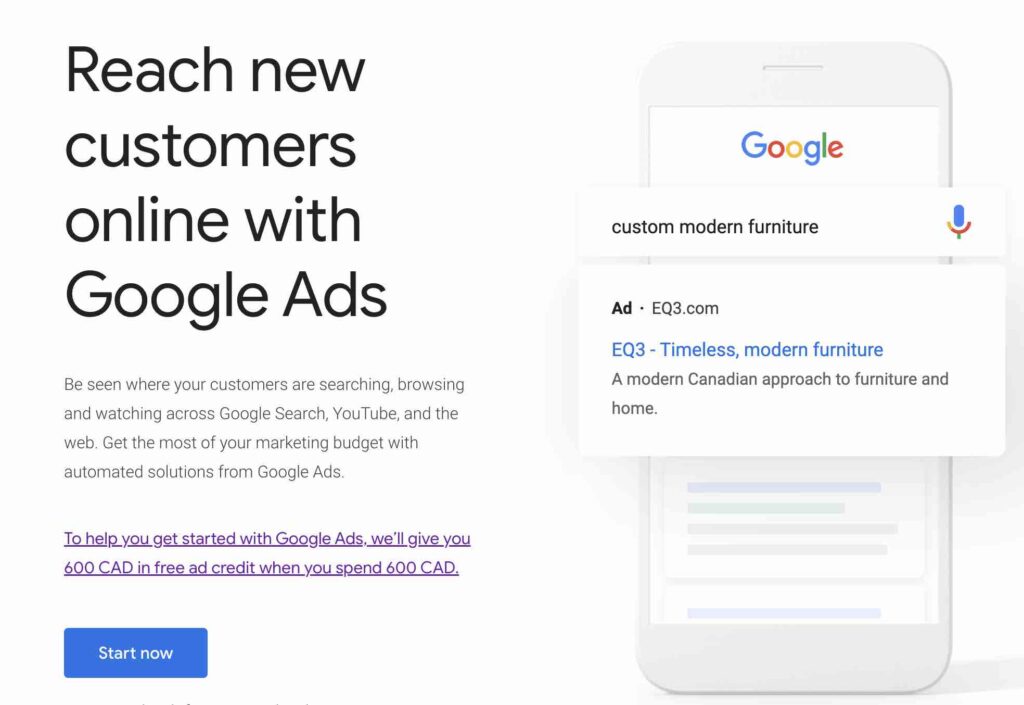
Basically, Google Ads sells Google search placements to the highest bidder. If you bid on competitive keywords, then you can expect to spend a lot of money. However, a skilled Google Ads agency can find easy-to-target keywords even in the most competitive audiences.
Here’s a high-level breakdown of how Google Ads works.
- Create a Google Ads campaign, complete with keywords, ad headlines, images and landing pages.
- Bid on a set of keywords related to the products or services you offer on your website.
- Google’s algorithm selects the best ads based on how much readers liked them (ad quality), how relevant they are to the keyword, and how much money you bid.
Each time someone conducts a search, Google’s algorithm decides which ads to return at the top. Every time someone clicks on your ad, you pay a fee to Google based on that keyword’s Cost-per-Click, aka CPC, although, other bidding strategies available as well.
6 Useful Google Ads ChatGPT Strategies You Can Implement Today
Now that you understand how Google Ads works, you can begin thinking about how to implement ChatGPT in your workflow.
Above all, you should know that the quality of your prompts matters significantly if you want to receive high-quality answers. The more specific your questions are, the better an answer you’ll get. But when you ask for specificity, make sure that you provide context. Tell them about what niche you’re working in, or about the product or service you’re advertising. Don’t just type a few words in expecting to get a good result.
Listed below examples will save you tons of time and allow to avoid basic mistakes and wasting your Google Ads campaign budget.
1. Discover Customer’s Pain Points
ChatGTP can help identify customer’s pain point and different selling angles. ChatGPT can be used as part of your primary research to come up with an effective ad that focuses on the pain points of the customer.
Here is an example of a ChatGPT prompt: [Act like you are a Google Ads professional with 15 years of experience. We need to create Google Ads for a chiropractor studio. Please identify and create and list of the main pain points of the ideal customer to make the ads more effective.]
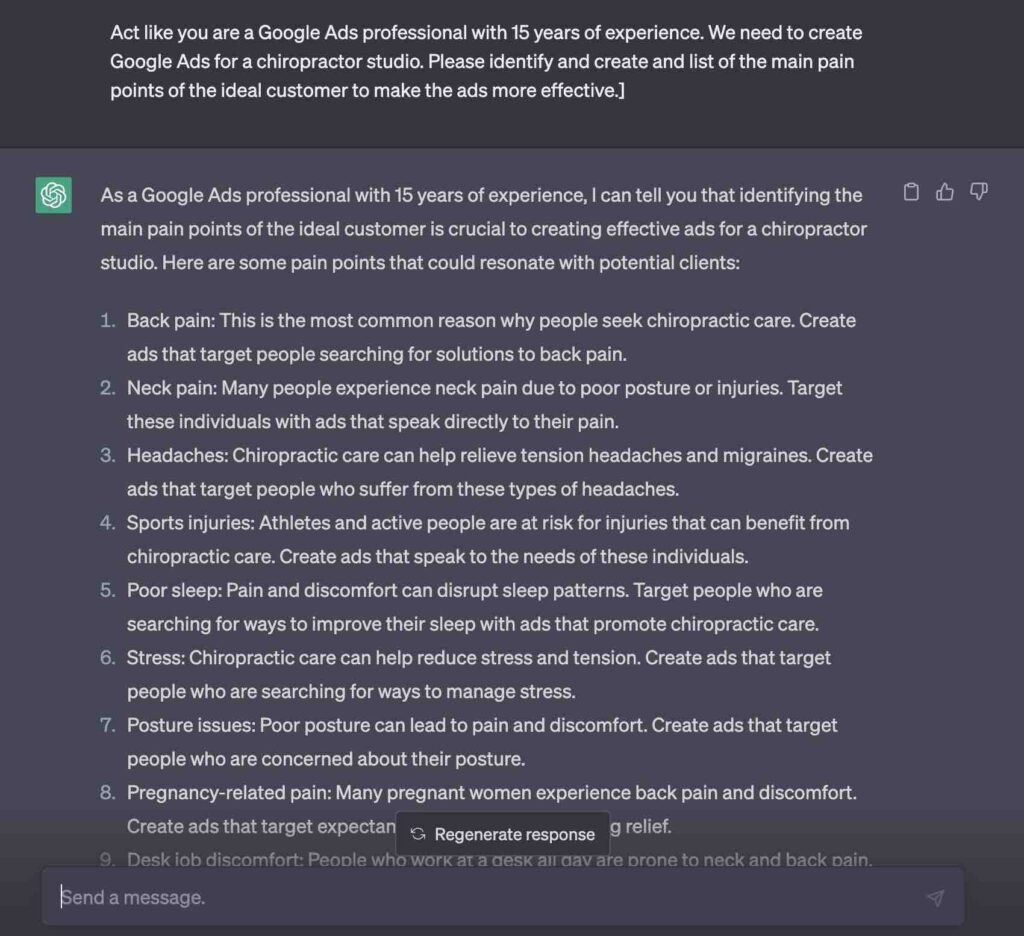
2. Target Keyword Research
Let’s start off by saying, ChatGPT is not a replacement for Keyword Research on Google Keyword Planner or some other analytics platform. That said, ChatGPT is pretty useful for coming up with keyword clusters and ideas. If you don’t have any clue where to start when trying to think of keywords for a particular campaign, ChatGPT does the job pretty well.
When you do keyword research, you might find that some of the most valuable keywords target topics that you really don’t understand. That can make it difficult for you to write the ad headlines, meta descriptions, and landing page copy.
ChatGPT excels at giving you a cursory glance at a topic. It will help familiarize you with the most salient concepts in that niche. If you have questions about a particular subject you can continue the conversation and drill down harder.
This is an extremely underrated part of ChatGPT. Previously, researching a new subject might have required you to spend hours watching YouTube videos and reading articles. Now, the tool just lays down everything you need to know point by point, it does the research for you and takes notes. Just remember to spend a bit of time fact-checking and avoid making a fool of yourself.
Here is an example of a ChatGPT prompt: [I am trying to run a Google Ads campaign for a productivity app that helps people balance their work life with their other activities. What are some good keywords for me to use in the campaign, group them by keyword cluster. For instance, you could have one cluster that targets “work-life balance” and another cluster that targets “time management apps”]
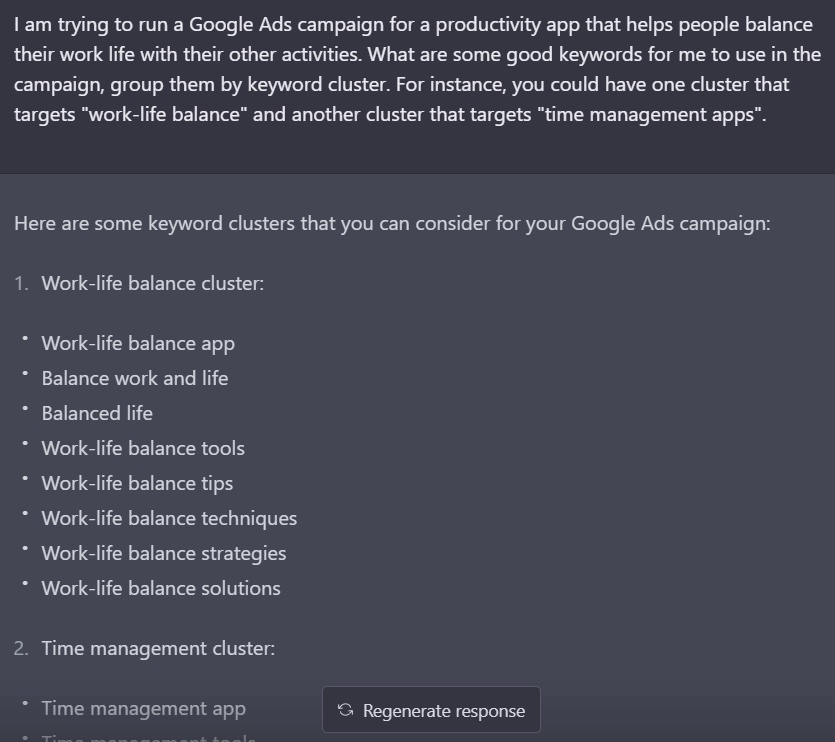
There isn’t enough room to include all the keyword outputs it gave, but it offered about 5 keyword clusters with 8 keywords each. That’s plenty of keywords to help you get started in Google Keyword Planner, and you can always ask it to give you more suggestions and more clusters.
Note that it’s important that you get the prompt right. If you just put “give me Google Ads keyword ideas for a productivity app”, you won’t get the best suggestions. And you certainly won’t get them clustered based on different audiences as we did.
3. Negative Keyword Research
To save money, you must figure out what keywords NOT to include in your PPC campaigns. This is usually an ongoing process. Analytics feedback will help you identify which keywords are giving you a low ROI.
However, the advent of ChatGPT speeds this process up significantly. You don’t need to wait to view your Google Ads Performance before deciding on negative keywords. Just ask ChatGPT for a few ideas based on your product and the keywords you want to target.
Here is an example of a ChatGPT prompt: [Suggest top 20 negative keywords for a google ads campaign promoting local chiropractor services].
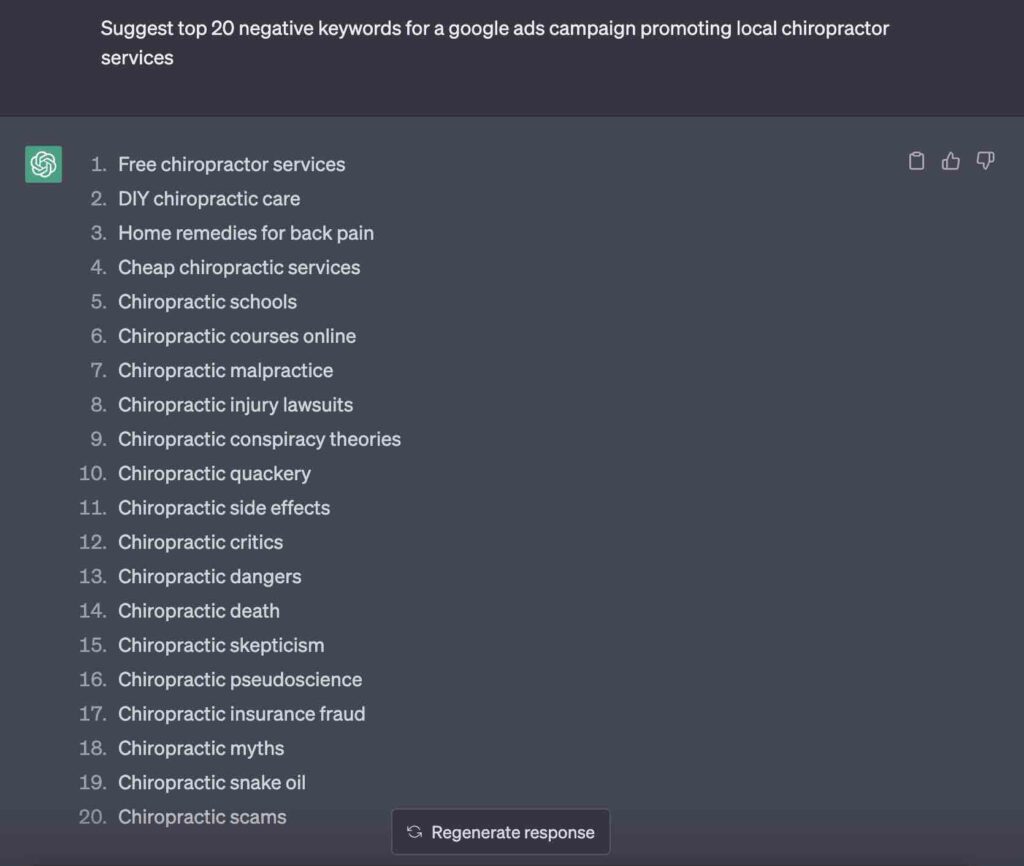
The output is quite good especially for someone who has little to no experience with Google Ads and excludes most irrelevant searches related to free or DIY services, schools, scams, myths, etc.
4. Audience Ideas
If you’re thinking of running a Google Ads campaign, then you likely already know about your target audience. That said, ChatGPT can help you uncover some customer groups that you didn’t expect would be worth your while.
Once again, this isn’t a replacement for actual split tests and audience research using keyword tools and future campaign data, but ChatGPT is still pretty good at making logical inferences about what target markets might be good for your product or service.
Let’s look at another example of a real-life ChatGPT prompt you could use. This will follow the same thread as the productivity app prompt we discussed earlier.
Here is an example of a ChatGPT prompt: [What are some potential target audiences for this productivity app I described?]
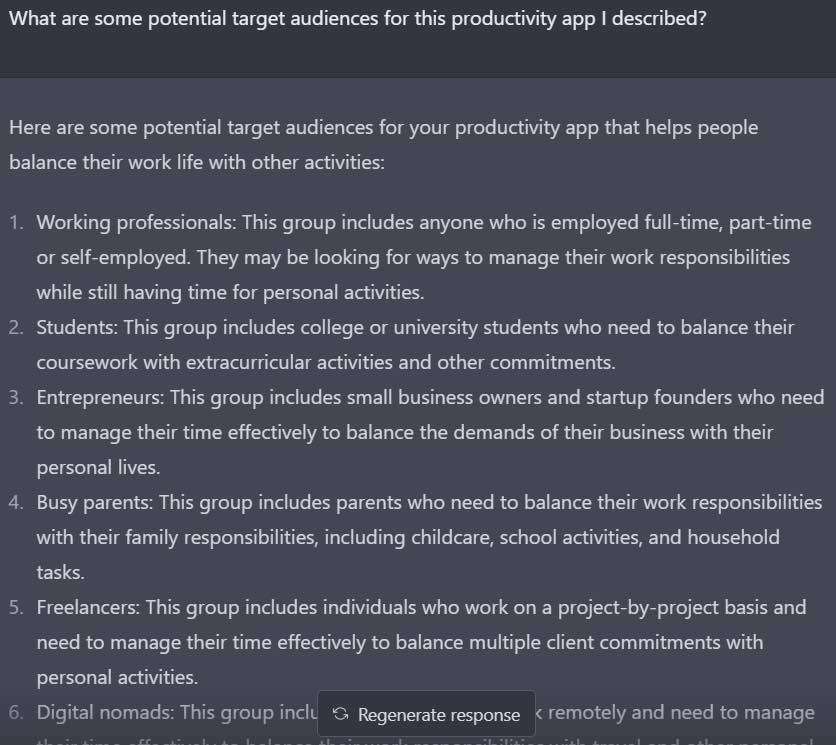
You can’t see it in the screenshot, but it actually gave 7 different audiences, a few of which I would not have even thought of. Each of those audiences searches for its own set of keywords. Who would have thought you could target parenting keywords for a productivity app? But the right keywords could make sense. This saves you a lot of research time once again.
5. Outline Landing Pages
We already noted that ChatGPT is good for topic research and outlines.
While we wouldn’t rely on ChatGPT to produce a complete landing page, including sales copy, it is still quite useful for providing outlines. It won’t replace human creativity, at least, not yet, but for now, it could create quickly scan the wed universe and suggest a decent landing page outline based on what’s most common online. It should be able to tell you all the key touchpoint your landing page should cover, which would save a lot of time brainstorming ideas.
Warning: be careful with the prompts, sometimes ChatGPT provides the page as HTML instead of giving an outline.
Here is an example of a ChatGPT prompt: [Act like you are a professional copywriter and web developer with 15 years of experience. I need to create a landing page for a chiropractor studio in NYC. Please outline what content sections I should use for a high-converting web landing page.]
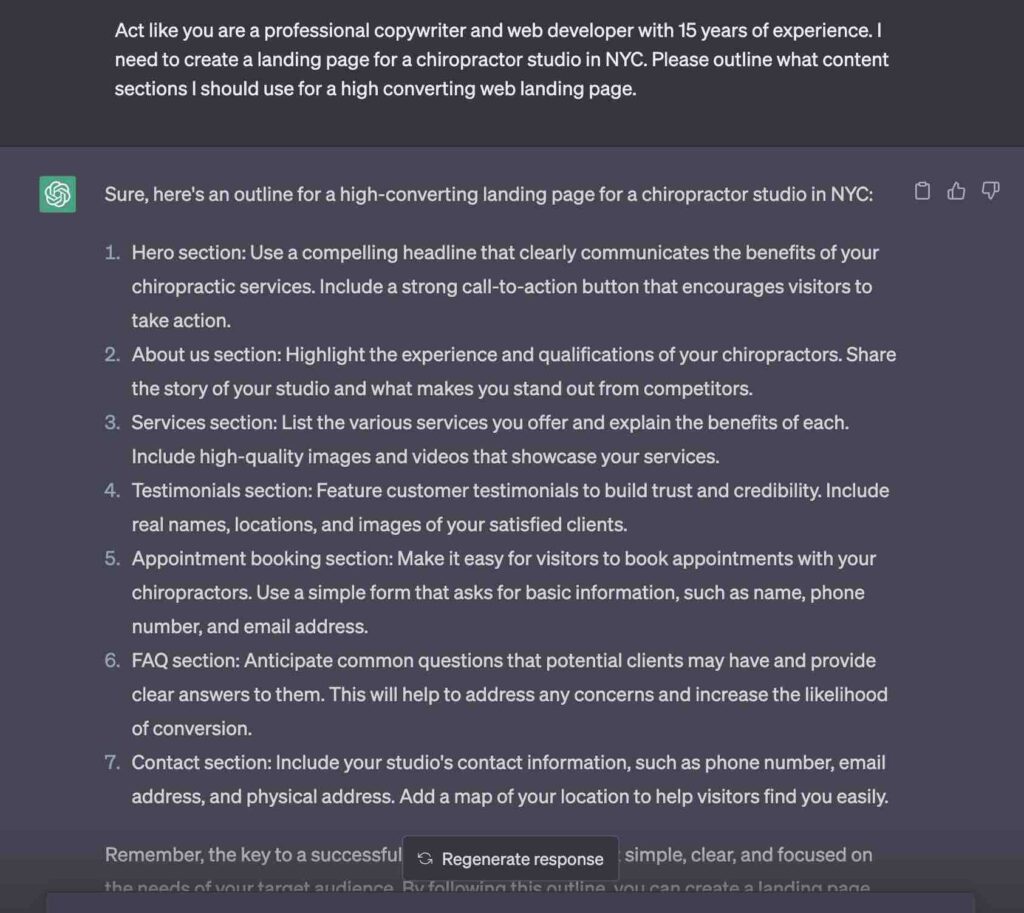
When it comes to getting the ad copy wording right, though, it’s best to hire a professional, although there are many ways how ChatGPT can improve and take your copywriting to the next level.
6. Ad Extension, aka Assets, Ideas
Ad extensions, recently renamed into Assets, are a key component of Google Ads that a lot of newbies miss. Basically, they are various links you can add to your ads that allow you to take up more space on Google’s search pages. At the same time, it also allows you to give your audience more options to explore your page or offer more social proof to convince them to buy from you.
You can ask ChatGPT for ad extension ideas based on your specific product and audience. Examples include Callout, Structured Snippet and Sitelink, extensions. ChatGPT and help you validate your product’s success.
Here is an example of a ChatGPT prompt: [Act like you are an experienced Google ads professional. I need to create Sitelink extensions for a real estate agency website in Toronto. Please create a list of 4 sitelinks with site link text and descriptions.]
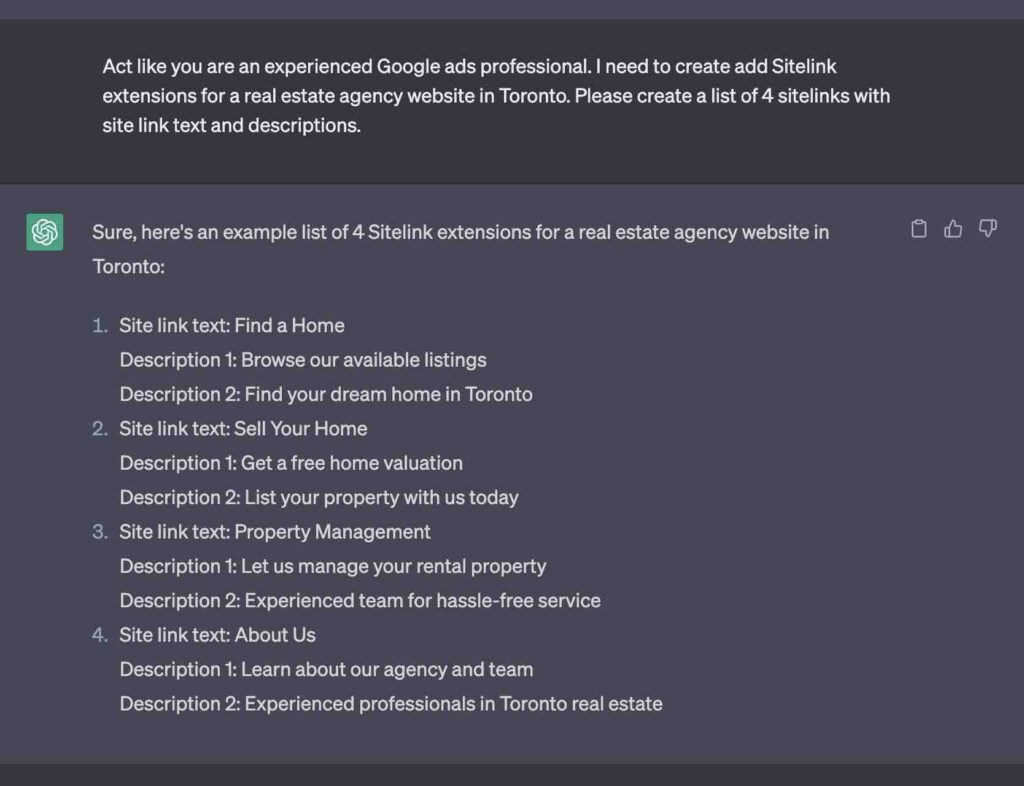
Once again, this reduces the amount of time you must spend brainstorming ad extensions yourself.
When ChatGPT Is Not Enough
At every step of creating Google Ads, you’re going to run into speedbumps. In some cases, especially when it comes to writing, you’ll likely be tempted to run a few ChatGPT queries to try and dig yourself out of the mess.
It’s tantalizing to use ChatGPT for everything, but you should be wary of the platform’s limits. Here are a few cases where we highly advise against using ChatGPT with Google Ads.
Writing Ad Copy
ChatGPT might be able to mimic human-generated writing pretty well, but if you actually read what it writes, it gets pretty repetitive after a while. This is exactly the opposite of what you need when you’re trying to engage your audience on a landing page or trying to get them to click through your ad.
You could occasionally use ChatGPT to clear writer’s block but don’t expect it to produce anything resembling a final product when it comes to writing.
Competitor Research
ChatGPT can get pretty granular, but it won’t give you much advice about what keywords your competitors use in their Google Ads campaigns. If anything, they might point you in the wrong direction. Not everything ChatGPT says is true.
Instead, Google Keyword Planner has a neat feature that allows you to search your competitors’ websites to see what keywords they use on their pages. You can also search Google for the terms you want to use to see which ads currently show up, and read the ad copy they’ve written. Unfortunately, AI has not replaced this particular style of manual work yet. And there is a degree of analysis and synthesis involved as well.
Budgeting & Bidding
It should go without saying, but ChatGPT definitely can’t access your Google Ads account and run your campaigns for you. Moreover, it won’t make much sense for it to come up with budgeting and bidding strategies when it won’t have access to all the data you have about the average bids on keywords and your business’ own budget.
Bidding strategies are something that takes experience to develop. This is where the expertise of a Google Ads agency is extremely valuable. They have the best intuition on how to allocate a budget for an ad campaign.
Adjustments & Optimization
Once you’ve collected all your keywords, written all your ads, and begun to publish your campaigns, your work still hasn’t finished. For a while, you’ll let your budget run its course and sit back and observe your campaign performance. Which keywords are earning you the most clicks? Which landing pages are converting the most visitors? These are all considerations you need to make.
ChatGPT can’t see any of this, and it can’t work with real-time data either, at least, not yet. It won’t be able to decide where to reallocate your funds or evaluate trends.
Hire New Digital To Handle Your Google Ads Professionally
When you’re considering whether or not to use ChatGPT for your Google Ads, you should ask yourself about your underlying motivations. Most likely, you’re using ChatGPT to save precious time managing your digital marketing campaigns.
That’s the issue, though. ChatGPT only covers the basics of Google Ads effectively. Everything else, from keyword research to landing page copy, requires special skills that take years to perfect. If you’re going to try doing those things on your own, all while juggling your business’ daily operations, you’re in for a world of trouble.
Instead of trying to find a shortcut with ChatGPT, you should look to Google Ads professionals like New Digital to create and manage your campaigns.
With hundreds of satisfied clients in our portfolio, we’re sure to find a campaign strategy that works for you. Just reach out to us and let us know a bit about your business and goals so we can start bringing you more traffic, and more leads.
